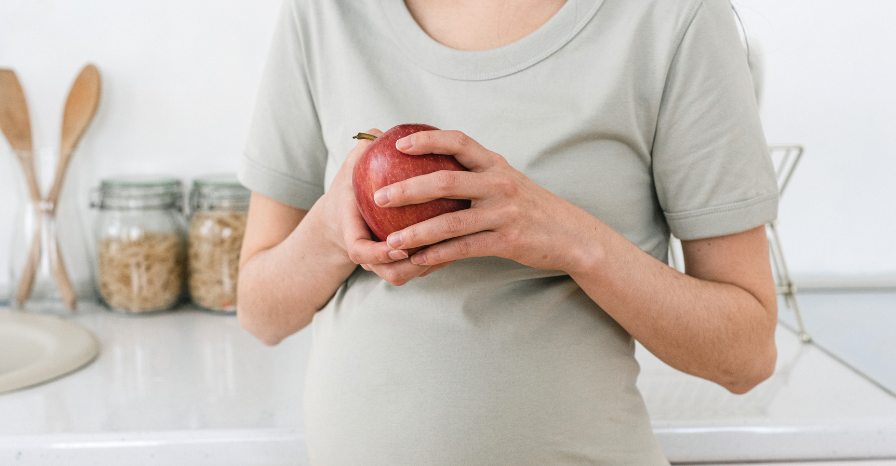
Pregnancy and Breastfeeding- A Nutrition Guide
PREGNANCY & POSTPARTUM |A pregnant or lactating mother’s diet directly affects the baby’s growth and development. The baby receives nutrients through the placenta while in the womb and via breast milk when breastfeeding. The mother, therefore, must try to maintain a balanced diet and incorporate all the required nutrients in her diet to stay healthy, as well, for the wellbeing and development of the baby.
What should I eat during pregnancy?
Pregnancy and giving birth to a child can be physically and mentally exhausting. Pregnant and breastfeeding mothers should eat a nutrient-dense diet to fulfill their energy requirements and to support the child's nutrition.
Foods to consider for pregnant & lactating mothers:
- Fiber-rich foods: Fiber will help avoid constipation and help regulate bowel movements during pregnancy; especially after delivery. Whole-grain breads, pastas, and roti should be included in the diet.
- Protein: Mothers generally miss on adding enough protein to their diet. The demand for protein increases in sync with the growth and development of the baby. Protein is required to support the placental health and post-delivery, protein is essential for the mother’s recovery and milk production. Lentils and vegetables like peas, nuts, seeds and tofu should be a part of the diet.
- Fruits & Vegetables: They will provide fiber along with essential vitamins and minerals needed to support various bodily functions and overall health.
- Nuts, pulses and dried fruits: They are a good source of good fatty acids (omega-3 ALA) and important nutrients like calcium and choline (in nuts like almonds).
- Green leafy vegetables: They are rich in vitamins B6, C, potassium, fiber, and folate. Folate is a vital nutrient required during the early stages of pregnancy to support the baby’s development.
What foods should I avoid during pregnancy?
1. Alcohol: It is recommended to avoid alcohol during pregnancy as it can affect the baby’s development. There is no known amount of alcohol that is safe for a woman to drink during pregnancy and thus it is recommended to avoid it.
2. Fish with high mercury: Mercury is a toxic element and is not safe for consumption. It can affect the baby’s vital organs. The pollution level in the sea waters can cause mercury accumulation and therefore it is better to avoid fishes such as tuna and king mackerel.
3. Raw foods: Raw foods are more likely to contain germs that could cause foodborne illness, including raw eggs and sprouts. One must also avoid unwashed fruits and vegetables and uncooked food.
4. Unpasteurized products: Unpasteurized milk, milk products, juices, unpasteurized soft cheeses have the risk of being contaminated by potentially hazardous organisms such as Listeria. These infections can affect the baby’s health while also putting the mother at risk.
5. Caffeine: Caffeine in moderation (less than 200 mg per day) is considered safe but drinking high amounts of caffeine may be harmful to the baby.
You should consider talking to your health care provider about whether drinking a limited amount of caffeine is okay for you.
Why is supplementation a requisite?
Adequate amounts of nutrients will ensure a healthy pregnancy and healthy energy levels. A wholesome, balanced diet can help you to fulfill the nutritional requirements during pregnancy and postpartum. However, as the nutrient requirements during these stages are more than the daily requirements, supplementation is necessary.
Pregnancy symptoms like morning sickness may also contribute to the need for a prenatal supplement. A prenatal multinutrient supplement will help you maintain the nutrient stores and avoid any nutritional or vitamin deficiency.
Also, if you are following a particular diet or have certain dietary restrictions, you may be prone to deficiencies which can be avoided with supplementation.
Additionally, certain nutrients are difficult to obtain from the diet alone, for example DHA. Supplementation can help bridge this requirement.
One must also consider folate supplementation to reduce the risk of preterm birth caused by folate deficiency and supplementation of iron to avoid the risk of anemia and support iron stores.
Kindly Note: Each pregnancy is unique and different. Depending on the current health of the mother and the baby, her nutritional status and her health background, the mother’s requirements will differ. There is no one diet or nutritional guide to suit all the mothers. You can consult your health practitioner and nutrition guide to understand your nutritional requirements during pregnancy and breastfeeding.

